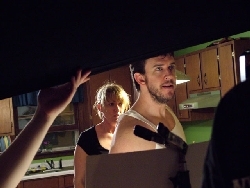- Trailer (quicktime) -
Directed by: Patrick Rea
Running Time: 100 minutes
Body Count: 9
Meet the Nance's - your average young American family, looking to move to a peaceful, affordable town, where they can make a living and raise their little boy Michael. Budding life - a new marriage, a new home, a new child. In The Empty Acre, all of this will be decimated to dust. Where there should be happiness and elation, there is depression and aggravation. Where there should be cattle and fresh budding crops are corpses and a plot of earth so dead, not a blade of grass can survive on it. Something is out there on the Nance's farm - a presence so dark and needy that it is feeding off every bit of life around it.
This Kansas set feature film debut for Patrick Rea is an accomplishment in original storytelling, fine acting, and a dark bedtime type story that will keep you yourself feeding off the depression ripping this family apart. In novel like fashion, The Empty Acre takes just enough time to identify its characters and turn a domestic family drama into something much more sinister. At the point where you find youself concerned for this couple - things suddenly take a turn for the worse. Soon everything is unraveling to the point where you are immersed in death, negativity, and a mere fight for survival. What The Empty Acre does is take this familiar gradual progression of lukewarm offensiveness to the point of no return, until you find yourself an hour into a film littered with corpses and the sucking death of a ghost town dying before your eyes.
Things begin promising for Beth Nance (Jennifer Plas) and her new husband Jacob (John Wilson). A newborn son and the open future of a new home and life. But almost as soon as they move into their new home, in all begins to unravel. Strange sounds come fromthe field at night. A gap is growing between Beth and her husband - a negative vibe generating arguements and depression. Paranoia and seperation ensue, until finally one night, the baby is gone from its crib while the two argue downstairs.
While the town focuses on the two and their problems as invasive as a small town would - picking apart their peronsal lives and problems to the point where everyone is gossiping over whether or not the mentally unstable Beth may have done this to her own child - a much bigger problem is growing. Beneath that dead plot of land is an entity that escapes into the darkness of night like a black mist - a formless, embodiment of nothingness - that takes lives night after night around the plot and its borders. Dogs, cattle, and other people turn up missing day after day. And as Chief Jefferson (Ari Bavel) looks into this rash of "mystery kidnappings" - more is uncovered. Ghost towns - scores of missing people. All unexplained.
The horror that this film offers is not in the form of blood and guts - but moreso in tension, confusion, negativity, and unexplained deaths. Where it has a chance to turn into a run-of-the-mill "I'm gonna get my baby back" story, it immediately retreats and throws in more death and confusion, to the point where, almost realistically, the problems become so out of hand that finding the baby becomes put on the back burner to just getting out of this situation alive. A nearby neighbor played by Robert Paisley holds the answers to just what's been going on - but by the time Beth finds out the answers to what happened to her child - her own life is on the line.
This picture is well shot and picturesque - depicting Kansas more complimentarily than any other piece of media Ive seen. The magenta sunsets and colorful farmlands glow between chapters - segways of midwestern beauty that contrast the life and death quite effectively. Their vibrance add to the easy distinction here between what is flourishing and what is dying. The scenes of tension and confusion are effective and dizzying. Jennifer Plas is a surprising gift to this movie, and convincing - her acting carries this film. Is she had faltered, which she didn't, a couple of otherwise unnoticable flaws would have been brought to the surface.
For instance, sometimes the soundtrack seems a little repetitive and overused. And sometimes it seems as if a familiar slice of film is being recycled yet again to reinduce, reimerse and redouse the viewer with the conflict at hand. But, especially for an independent and debut feature filmmaker - Rea has sharpened his skills through shorts and other work enough to avoid typical newbee mistakes of a seethrough screenplay stretched too far or poorly edited reel. His original and dark tale of The Empty Acre comes across clear and smooth, and almost lulls the viewer into an uncomfortable conflict with the grace of an experienced director.
 |
| On the set of The Empty Acre (2006) |
Final analysis: There's a lot to like about this film. Not overconcerned with the task of wowwing people with eye-gags, insanely retarted plot twists or over-the-top gore - The Empty Acre is a smooth ride on the American family into the depths of depression, despair and death. It will deceive viewers with plainness and then before you know it, as cyanide is sickly sweet, there's nothing left to do but die. Calmly told and subtlely effective, this X-Files-ish tale of midwestern horror should identify with the average viewer and keep one effortlessly immersed. Better viewed in a calm, dark environment than in the bustle of a sunny, lively day, The Empty Acre is a solid unique tale without fireworks that should satisfy that mental hunger for what we so often find ourselves without - a simple, original and effective horror movie.
Official Site
IMDB Page